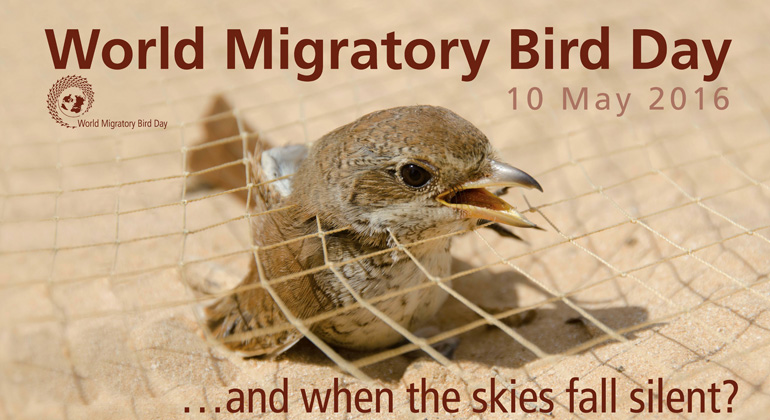New Task Force Set to Stop Illegal Killing, Taking and Trade of Migratory Birds
On World Migratory Bird Day a new intergovernmental coalition aims to end the illegal killing, taking and trade of millions of migratory birds, starting in the Mediterranean.
The Convention on Migratory Species (CMS) announced today the creation of the Intergovernmental Task Force on Illegal Killing, Taking and Trade of Migratory Birds in the Mediterranean composed of Governments and the European Commission. UN organizations such as the United Nations Environment Programme (UNEP), the United Nations Office on Drugs and Crime (UNODC), international environmental treaties, INTERPOL, law enforcement and judiciary organizations, hunting communities and nongovernmental organizations will also be part of the coalition.
The announcement was made on the eve of the 2016 World Migratory Bird Day, celebrated around the world on 10 May under the slogan “…and when the skies fall silent? Stop the illegal killing, taking and trade!” to highlight how wildlife crime affects numerous species of migratory birds.
According to BirdLife International, an estimated 25 million birds, including endangered species of waterfowl, songbirds and raptors are killed illegally each year around the Mediterranean Sea alone, undermining efforts to protect them.
World Migratory Bird Day is co-organized by CMS and the African-Eurasian Migratory Waterbird Agreement (AEWA), international treaties administered by UNEP.
UNEP Executive Director Achim Steiner said: “During their long journeys, migratory birds run afoul of any number of natural obstacles, from predators to weather. They shouldn’t also have to duck the grasping claws of the illegal wildlife trade. Illegal taking and killing of birds threaten not only the survival of bird species, but ecosystems, communities and livelihoods as well. So World Migratory Bird Day is not strictly for the birds; it’s to remind us of the part they play for planet and people alike.”
Bird hunting has been traditionally practiced in the Mediterranean for centuries, but the recent surge in illegal activities, such as poaching and trapping, is endangering many threatened species that are already subject to other pressures, such as climate change and habitat loss.
Bradnee Chambers, Executive Secretary of CMS, said: “Wildlife crime is today clearly one of the greatest threats to some of the most iconic wild animals in the world, such as elephants, gorillas and addax antelopes. Unfortunately, it is also increasingly hitting millions of migratory birds travelling along all the world’s major flyways. Wildlife crime, especially in the form of illegal killing, taking and trade of wild birds, is a significant threat globally to many waterbirds, landbirds and birds of prey. Through the Task Force, CMS will coordinate international efforts to combat this unlawful persecution of migratory birds, starting with addressing the problem in the Mediterranean region.”
Jacques Trouvilliez, Executive Secretary of AEWA, said: “Migrating birds are facing increasing pressures along their journeys and habitat losses and degradation are the most difficult to tackle. But the birds are also exposed to illegal killing, taking and trade. We can no longer say that these practices are traditional as the equipment to capture birds has become more efficient. The nylon mist nets are now almost invisible to birds. As a result more birds are taken from declining populations. We must stop the illegal killing now, if we don’t want our skies to fall silent”.
Each year, up to 6.2 million exhausted birds, migrating between their breeding and wintering grounds, are caught in illegally set nets stretching for hundreds of kilometres along the North African coastline. The less lucky ones suffer an agonizing death on lime stick traps – twigs covered with extremely sticky glue. It is estimated that up to 2 million Blackcaps die in such traps each year. The Intergovernmental Task Force announced today will add new momentum to international efforts to tackle the illegal killing, taking and trade in birds by agreeing on new guidelines, recommendations and action plans to address the causes of poaching.
The Task Force will work towards changing the hunting practices in the region to make them compliant with national and international laws. It will also aim to enhance the enforcement of these laws through training of local police and judiciary, information exchange, promoting deterrence and prevention policies to end the large-scale killings of migratory birds taking place today.
The Task Force, which will hold its first meeting in Cairo from 12 to 15 July 2016, is expected to be replicated in other major flyways across the world. The socio-economic study on Hunting and Illegal Killing of Birds along the Mediterranean Coast of Egypt, which will be released by BirdLife International on World Migratory Bird Day will give important input to this meeting.
Tackling illegal killing and trade in wildlife, including birds, and mobilizing global action around the issue will also be the focus of the 2016 World Environment Day, which takes place on 5 June and is hosted by Angola, under the slogan “Go Wild for Life.” A global United Nations campaign to garner support for stopping the trade in many species and their products will also be launched.
Human threats to migratory birds
Illegal killing seriously affects a number of species protected under CMS and AEWA that are globally threatened with extinction. In East and South-East Asia, the Spoon-billed Sandpiper with a global population estimated at just 120-200 pairs has suffered an 88 per cent decline since 2002.
Poisoning causes high mortality in migratory birds. It seriously affects threatened species and certain birds of prey in particular. A variety of toxins used in insecticides and pesticides, which accumulate in the ecosystems, are deadly to birds. Poison baits, used for predator control, can also decimate local populations of scavenging birds such as vultures and kites. Lead ammunition and fishing weights pose a particular threat to waterbirds.
Residues of a veterinary medicine (Diclofenac) in carcasses of domestic livestock brought three species of vultures to the brink of extinction in India. Populations of most species of vulture are declining worldwide at an alarming rate. In Africa, most species are now classified as Critically Endangered by the International Union for the Conservation of Nature (IUCN). These natural garbage collectors are deliberately poisoned by poachers trying to conceal the carcasses of killed animals. Poison baits are also commonly used to take vultures for illicit trade.
Illegal trade in vultures and other raptors is contributing to their decline. Parts of their bodies are in high demand and traded as bushmeat or for traditional medicine and witchcraft. International trade in parrots and other wild bird species, such as the dinosaur-like Shoebill or the Grey Crowned Crane is having a devastating effect on their populations. Most parrots and other exotic birds do not survive capture or transport. To compensate for the mortalities, poachers have significantly intensified captures.
ADDITIONAL QUOTES FROM WORLD MIGRATOTY BIRD DAY PARTNERS
Patricia Zurita, BirdLife International CEO: “Bird migration is one of nature’s wonders, one that uniquely connects us, across borders. Tragically, migratory birds are disappearing. We, policy makers, scientists and civil society must work together to preserve their habitats and stop the massacres perpetrated every year along their flyways. WMBD is the moment to re-ignite our efforts to save these amazing ambassadors of peace and life.”
George Aman, President of the International Council for Game and Wildlife Conservation (CIC): “Hunters are the guardians of nature and wildlife. The International Council for Game and Wildlife Conservation, as the global platform of the hunting community, supports this campaign to raise awareness about the threats endangering migratory birds from poaching, wildlife trafficking to pollution and other obstacles. It is well-known that well-regulated, sustainable hunting is an important component of conservation, since it includes demonstrable actions against illegal killing, taking, and trade of migratory birds. Therefore, combatting wildlife crime is one of the strategic priorities of the CIC.”
Chief Executive Spike Millington of the East Asian-Australasian Flyway Partnership (EAAFP): “The theme of this year’s WMBD is particularly relevant to the East Asian-Australasian Flyway as our migratory birds face threats from indiscriminate shooting, poisoning and trapping on their journeys and are more vulnerable as a result of habitat loss concentrating birds into fewer sites where they can be targeted literally! However, the good news is that illegal killing is becoming increasingly highlighted, and stronger and more timely actions are now being taken by the responsible authorities in many countries.”








